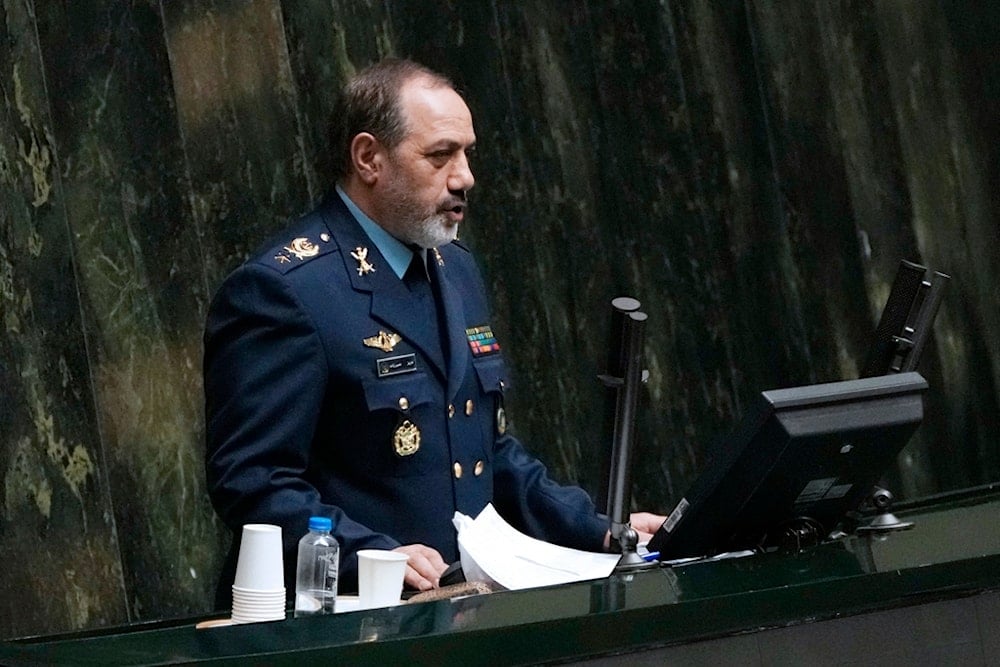Iran unveils new missile, vows to strike all US bases if attacked
Iran's Defense Minister Aziz Nasirzadeh warns of a strong retaliation targeting US military bases if Iran is attacked amid rising Iran–"Israel" tensions.
-

Iran's Defense Minister Gen. Aziz Nasirzadeh, prior to appointment, speaks during an open session of parliament on the third day, in Tehran, Iran, Monday, August 19, 2024. (AP)
Iranian Defense Minister Brigadier General Aziz Nasirzadeh warned that any attack on Iran would be met with a strong retaliation, targeting all US interests and military bases in the Middle East region, emphasizing that Tehran would act without hesitation.
Responding to threats from US officials, Nasirzadeh stated that "We hold no hostility toward our neighboring nations, we see them as brothers. But if we are attacked, US bases in the region will become legitimate targets."
صاروخ قاسم بصير، الذي يبلغ مداه 1300 كيلومتر،يتمتع بقدرة عالية على المناورة.
— Ali. ABk (@Bk_Hanasa) May 4, 2025
يحتوي هذا الصاروخ على بصريات في رأسه الحربي، مما يسمح له بضرب الهدف بدقة عالية في المرحلة النهائية(السفن أيضا).هذا الصاروخ لا يستخدم نظام التوجيه GPS وبالتالي فإن الحرب الإلكترونية ليس لها أي تأثير عليه https://t.co/e7QVCCWjp9 pic.twitter.com/5sXniJwPQb
The Iranian minister unveiled a new missile dubbed "Qassem Basir" pointing out that the newly unveiled missile possesses advanced guidance and maneuverability, making it capable of overcoming all defense systems designed to intercept ballistic missiles.
He added that "the Qassem Basir missile strikes its targets with high precision, can overcome electronic warfare, and remains undetected by defensive radar systems."
According to Iranian state media, the "Qassem Basir" missile was developed based on expertise gained during the two major "True Promise" operations.
Israeli Prime Minister Benjamin Netanyahu threatened Iran while discussing a potential Israeli response to a Yemeni missile strike on Ben Gurion Airport, holding Tehran responsible and vowing to retaliate at the appropriate time and place.
Tensions between Iran and the Israeli occupation have been on the rise in recent days, following the postponement of the fourth round of talks between Iran and the US regarding Tehran's nuclear program.
🔴 Unveiling of 1200km ( 🇮🇱-range) 🇮🇷 Haj-Basir terminally guided missile:
— Patarames (@Pataramesh) May 4, 2025
➡️ Enabling 2-3m CEP for pin-point strikes against hardened targets (+moving ships?)
Watch my video on the earlier Haj-Qasem, without terminal guidance ⬇️https://t.co/qLaJBHrGmapic.twitter.com/NAhlKnOgZ8
'Israel' eyes attack on Iran
According to foreign reports cited by the Israeli website Walla, Iran has approximately 2,000 ballistic missiles of different types capable of hitting "Israel".
The website, citing military affairs analyst Amir Bohbot, reported on April 29 that "Israel's" security establishment and political leadership are in a state of anticipation as they await US President Donald Trump's expected announcement regarding his stance on nuclear negotiations with Iran.
This sense of anticipation arises from the possibility that Trump could soon clarify whether the negotiations are approaching a deal or nearing breakdown, a situation that, as the website suggests, might create an opportunity for "Israel" to consider military action.
According to Walla, although the Israeli military has heightened its operational preparedness to strike Iran's nuclear facilities over the past 18 months, President Trump's recent remarks imply he would not permit Prime Minister Benjamin Netanyahu to launch a unilateral attack without prior coordination.
In a rare public divergence from the US president, Netanyahu called on April 25 for the complete dismantling of Iran's nuclear infrastructure, rejecting any deal that allows Tehran to continue enriching uranium. The Israeli PM's remarks follow statements by US officials that Washington does not necessarily seek to prevent Tehran from enriching Uranium.
Iranian officials have previously expressed openness to negotiate certain restrictions on the country's nuclear program, however, they rejected the possibility of ending Tehran's Uranium Enrichment Program or giving up its stockpile of enriched Uranium, stating that these are "red lines" for Iran.

 3 Min Read
3 Min Read








